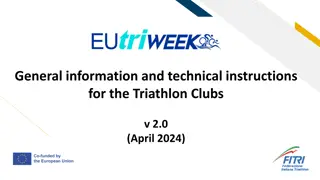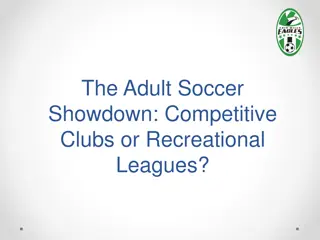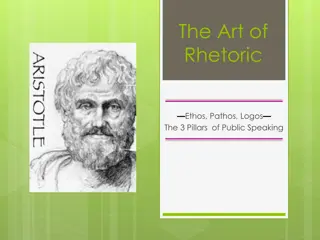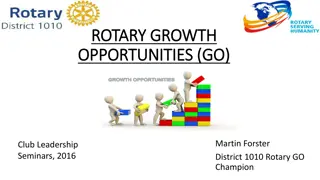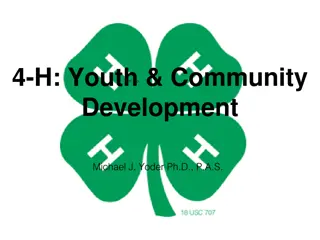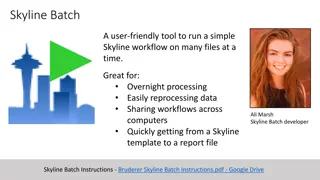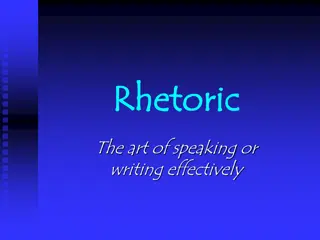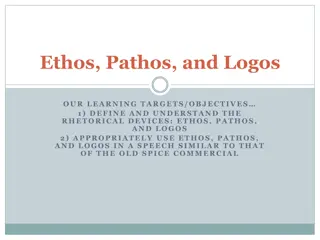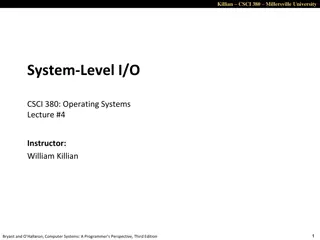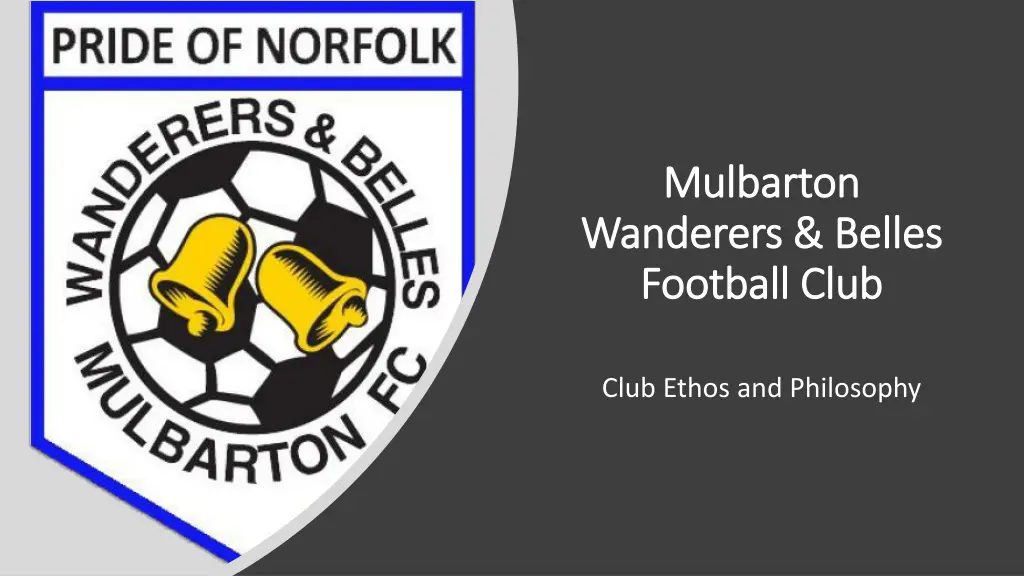
Mulbarton Wanderers & Belles Football Club Ethos and Philosophy
Explore Mulbarton Wanderers & Belles Football Club's ethos and coaching philosophy, dedicated to providing a fun, safe, and developmental environment for young players. Discover their club values, coaching aims, and the crucial role of parents in children's sports participation.
Download Presentation

Please find below an Image/Link to download the presentation.
The content on the website is provided AS IS for your information and personal use only. It may not be sold, licensed, or shared on other websites without obtaining consent from the author. If you encounter any issues during the download, it is possible that the publisher has removed the file from their server.
You are allowed to download the files provided on this website for personal or commercial use, subject to the condition that they are used lawfully. All files are the property of their respective owners.
The content on the website is provided AS IS for your information and personal use only. It may not be sold, licensed, or shared on other websites without obtaining consent from the author.
E N D
Presentation Transcript
Mulbarton Mulbarton Wanderers & Belles Wanderers & Belles Football Club Football Club Club Ethos and Philosophy
Contents Player Club Ethos Coaching Philosophy Age Groups 12-16 Age Groups 5-11 Role of the Parent Development Our Club Ethos is a written declaration that sets out how we want to run as a club. It is simple and concise and can be understood by players, parents and officials. We promote an holistic approach to player development based on the FA s Four Corner model for long term player development. Our clearly defined coaching philosophy provides direction, purpose and guidance to the process of coaching young players Coaching guide for players aged 12-16 years. Coaching guide for players aged 5-11 years. The parent has a key role in their child s development and enjoyment of the sport.
Club Ethos To provide football for children of all abilities in a fun, friendly and safe environment To promote player development through age appropriate coaching according to the FA s long term development plan To promote the team values, good behavior and respect to others through our coaching and our Club s Codes of Conduct To offer a challenging but supportive environment where children can learn from their mistakes without undue pressure To encourage players to always try their best, strive to win and make the most of their abilities
Coaching Philosophy Our clearly defined coaching philosophy provides direction, purpose and guidance to the process of coaching young players. Coaching Philosophy
Coaching Aims Make the game safe, fair and enjoyable Provide age-appropriate coaching (5-11, 12-16, 17+) Develop the whole player across all four corners of the FA s long term player development model Improve the player s movement skills: agility, balance, co- ordination and speed (ABSs) Develop the player s technical skills Improve the player s decision-making capabilities Teach the player life skills (co-operation, teamwork, communication, work ethic, overcoming adversity, leadership, confidence, discipline and friendship) Coaching Philosophy
Role of the Coach Mentor Listen to the players, give advice and extend their thinking Facilitator Allow players to enjoy playing the game Motivator Set appropriate challenges to inspire the player Friend Make the environment welcoming and inclusive Coaching Philosophy
A Good Coach Encourages players to try new skills Enthuses and motivates players Supports and inspires regular practice Encourages children to be the best that they can be Priorities the unique individuality of the child Puts the child and their needs at the centre of all activity Coaching Philosophy
Coaching Qualifications As a minimum, all coaches at our club will undergo the following training courses: The FA Level 1 Award in Coaching Football FA Emergency Aid FA Safeguarding Children Workshop All our coaches have Enhanced FA CRB checks The FA requires everyone who works or volunteers in children s football and regularly cares for, trains, supervises or is in sole charge of children to apply for an FA CRB Enhanced Disclosure Our coaches are responsible for ensuring their qualifications are up-to-date. The Club pays for, and supports, all of our coaches courses We expect our coaches to develop their own knowledge through FA CPD events, books and online resources such as hive learning and the FA Boot Room Coaching Philosophy
Coaches Behaviour Coaches are required to strictly follow the Respect Code of Conduct Players must be free to play during matches, with positive encouragement from parents and coaches Information from the touchline should be in the form of occasional questions from the coaching team Patrolling the touchline giving continuous shouted instructions must not happen Players always try their best and will learn from their mistakes without being told they have done wrong Coaches must show respect and restraint at all times to match officials, opposition, parents and players Coaching Philosophy
Player Development A holistic approach based upon the FA s four corner model for long-term player development: Technical, Physical, Social and Psychological. Player Development
Player Development Player Development
Technical Encourage players to try new skills in practice and work out where they can be used in a game Where appropriate, practice should replicate the demands of the game, encouraging player to think and make decisions just as they would in a match Vary the difficulty to match the needs of the individual by altering the Space, Task, Equipment and Players (STEP) Cut down on the stop, stand still phrase and let players experience the flow of the game and practice Player Development
Physical Appropriate movement skills which develop agility, balance, co-ordination and speed should be encouraged through enjoyable games such as tag Through well designed practice, all coaching activities can include physical outcomes Remember players grow at different rates and may need support and patience as they develop Children are not mini-adults and shouldn t be subjected to laps of the pitch or press-ups Player Development
Psychological Use different methods of communication to engage with different types of learners Visual (seeing): Tactics boards, posters, diagrams, cue and prompt cards as well as cones on the pitch Auditory (hearing): Speak with players, ask questions, encourage discussions in groups among the players to solve game-related problems Kinaesthetic (doing): Demonstration to the team by the coach or by a player to their team-mates Player Development
Social Be a good role model for the players Create a positive and welcoming environment Praise players for their effort and endeavor as well as their ability Manage mistakes to the player s advantage understand what they were trying to do. Sometimes they will have the right idea but just fail in the execution of the technique or the skill Make sure football is fun, but with a purpose. Ensure the development of skills and game understanding Player Development
Ability and Opinion A player s performance in practice and matches can be influenced by the following factors, all of which need to be considered when forming an opinion of a player s true ability: Date of Birth, Body Type, Adolescent Growth Spurt, Physical Maturity, Psychological Maturity, Social Maturity, Previous Experience, Opposition, Own Team s Playing Standards, Position Suitability, The Instructions Given to the Player, Recent Playing Activity Player Development
Growth and Maturation Appreciate that all players are growing and maturing at different rates Be patient, supportive and encouraging with ALL the players in your squad Understand that all some players need is time Don t mistake levels of physical maturity for maturity in other areas Don t assume that the current success of a player is an indicator of on-going proficiency Don t over-burden the players that represent the extreme early or late developer Player Development
Relative Age Effect Recruitment trends in professional academies show a bias towards players born between Sept-Dec, making them the older players in their age group Design and deliver challenges which offset the relative age effect; Consider changing the pitch size, the size of the ball, rules of the practice/game, the game format Consider grouping bigger and physically developed players to compete against each other in practice Player Development
Minimising Distractions By planning ahead the coach can create an environment that minimises distractions and helps players to stay on-task for longer Organise sessions that are interesting, challenging, varied and fun Avoid players being stood in line or asking them to wait around for too long without a focus Plan arrival activities so players can begin practicing as soon as they arrive Player Development
Managing Behaviour Outline rights and responsibilities to players. Refer to FA Respect Codes of Conduct Praise and reward good behaviour If you have to intervene do so in a calm and controlled manner If boundaries are consistently broken then there should be a consequence As a coach, remember the only person s behavior you can control is your own so set a good example Player Development
Formats of the Game Young players should be exposed to a variety of games they can actually play rather than struggling to understand a game created for adults Whilst leagues have the option of running smaller-sided competitions for players in the U7 and U8 age groups, the majority still opt for the 7v7 format We hope to see local leagues adopt the FA s latest proposals for revised game formats Player Development
New FA Proposals for Revised Formats of the Game Player Development
Coaching Recommendations for Players Aged 5-11 Creating a positive and enjoyable learning environment which prioritises skill development, decision-making, fundamental movement skills and experimentation is crucial for young players in this age-group who are learning how to play. Age Group 5-11
Positive Learning Environment Encourage players to be creative and take considered risks in both practice and games Remember mistakes do happen Let players make some of the decisions Let them know that their opinions count too Create opportunities for players to explore, question and foster their natural curiosity and imagination Allow all players to experience success Age Group 5-11
Let the Players Play All children should be given equal playing time on match-day wherever and whenever possible Help players develop their game- understanding by rotating positions during practice and games Ensure players are given the chance to play a game during every practice session Don t let the children s arena become dominated by adults Age Group 5-11
Skill Development and Decision Making Practice should replicate the demands of the game as much as possible. Give lots of opportunities to practice different aspects of the game (shooting, dribbling, tackling, passing, goalkeeping), in context Goals should be used in practice as often as possible to help players enjoyment and motivation Small-sided games on appropriate sized pitches provide young players with opposition, decision- making and challenge, all of which help their skill development Age Group 5-11
Themed Practice Try and link the different parts of a coaching practice together. For example: Warm-up: Players work in twos passing through a variety of different sized gates, using different techniques and surfaces of the foot Skill development: Play a small-sided possession game (e.g. 3v1 or 4v2) on appropriate sized pitch Game: Any 4v4 game with a focus on passing or a through-the-thirds game Age Group 5-11
Appropriate Challenges Set challenges in practice sessions, e.g. Use your weaker foot when you can in practice Reinforce the learning focus from practice sessions on match day Set players specific challenges that link to the theme of a recent practice session, which can be discussed at half-time and after the game During practice sessions try to match players up in lots of different ways in order to meet their individual needs Age Group 5-11
Develop Fundamental Movement Skills Between the ages of 5-11 players have a window of opportunity to develop their agility, balance, co-ordination and speed (ABCs) Coaches should be creative in their practice design and build in a physical benefit for the players, e.g. Tag Games Running and Dodging Throwing and Catching Jumping and Balancing Age Group 5-11
Use a Variety of Interventions Young players don t enjoy being shouted at, having their mistakes highlighted or having to stop playing the game to listen to the coach talk at length A variety of coaching methods should be used to help players learn the game, for example: Command (Directive) Question and Answer Observation and Feedback Guided Discovery Trial and Error Age Group 5-11
Coaching Methods 5 Pillars Age Group 5-11
Use Small-Sided Games Players should experience a variety of formats of the game, played on appropriately sized pitches The game is essentially a series of different scenarios (1v1, 2v1, 1v2, 3v2 etc.) and players should experience a variety of these game-like challenges during practice sessions Coaches should use uneven sides in practice as a tool to challenge the players Age Group 5-11
Appreciate What its Like to Be Young What the game of football looks like for a group of 7 and 8 year old's will be significantly different to the game played by older players and adults If a coach tries to fast-forward young players to this level too quickly, important stages of development may be missed Young players shouldn t be benchmarked against adult professional players Age Group 5-11
Consider Young Players Self- Esteem Coaches should consider how their decisions will impact upon a young player s self-esteem, motivation and enjoyment of the game For example, what would it feel like to be repeatedly used as a substitute? Coaches should praise effort and positive behavior as well as good play Age Group 5-11
Things to Avoid Don t impose unrealistic adult expectations on young players Don t be so intent on winning games that young players miss out on the opportunities to learn and fall in love with the game Don t apply out-dated coaching methods with young players Avoid children standing in lines of queuing Don t discourage players trying to dribble/turn their way out of danger. Get rid is a phrase we never want to hear Age Group 5-11
ENGLAND DNA Foundation Phase The priorities outlined by the England DNA are a set of guiding principles for coaches to focus on in each of the age- phases. Coaching programmes will also include a balance of other themes to support these headline priorities. In Possession Stay on the ball, master the ball Develop a mastery of the ball and the confidence to try new things Excite with the ball and seek creative solutions Be exciting and positive in possession, playing with individuality and with elements of disguise and surprise Connect and combine creatively with others Combine creatively and intelligently with others to create and score goals Age Group 5-11
ENGLAND DNA Foundation Phase Out of Possession Positive and enthusiastic defending Enjoy winning the ball back, be difficult to beat 1v1 and look to start attacks when you get the ball Intelligent defending Be positive and creative in your positioning and ability to win the ball. Be alert when the opposition have possession. Master a variety of defensive techniques and roles Enjoy defending in a variety of roles and develop a range of techniques to regain possession Age Group 5-11
ENGLAND DNA Foundation Phase Transition Instinctive decision-making React quickly and positively when the ball the ball in won or lost and have a range of individual options and action. Positive and intelligent attacking reactions Have a positive attitude when possession is regained, traveling quickly with and without the ball. Take every opportunity to attack, create and score goals. Positive and intelligent defensive reactions Try to win the ball back quickly and prevent opponents from starting attacks. Be proactive when the ball is lost and have confidence in your ability to defend. Age Group 5-11
Coaching Recommendations for Players Aged 12-16 Coaches should continue to prioritise a positive learning environment (as recommended in the 5-11 section), ensuring methods and content are made appropriate to the age and ability of the players in this age- range. Age Group 12-16
Ensure Practices are Relevant and Realistic Realistic passing, receiving and possession practices which create appropriate pressure, interference and distraction will help young players develop their awareness and game understanding Become more effective off the ball . Develop an understanding of movement to support team- mates and how to create and exploit space Develop scanning, predicting and assessing skills to form a picture before receiving the ball Age Group 12-16
Develop Basic Tactical Understanding Introduce players to the 6 phases of the game: Attacking when opponents are in balance Attacking when opponents are out of balance Defensive play whilst in balance Defensive play whilst out of balance The finishing phase Goalkeeping Age Group 12-16
Introduce Some Position Specific Practices As players get older they will begin to recognise the significance of practice sessions to their role within the team Some specific positional practices should be introduced as appropriate This should be balanced with experience playing and practicing in different positions Age Group 12-16
Encourage Players to be Self- Reflective Players should be encouraged to reflect on their effectiveness in practice and games, and challenged to think about how they may improve next time This process may be done individually, in small groups or collectively It may be enhanced if the team/player and the coach discuss realistic and achievable challenges and goals to work towards Age Group 12-16
Encourage Creativity Coaches should continue to encourage players in this age group to be creative by designing challenging practice sessions Master the skill of posing effective questions to develop the players active involvement in the training and learning process Encourage players to think, examine, judge and evaluate to find their own solutions Age Group 12-16
The Introduction of Competitive Leagues During this phase leagues become competitive, meaning results and league tables are published This adds pressure to get results, but it shouldn t drastically change your coaching style Remember, winning is important but the player s development and enjoyment of the sport is more important Age Group 12-16
ENGLAND DNA Youth Development Phase The priorities outlined by the England DNA are a set of guiding principles for coaches to focus on in each of the age- phases. Coaching programmes will also include a balance of other themes to support these headline priorities. In Possession Stay on the ball, master the ball Look to receive the ball in all areas of the pitch and be prepared to stay in possession. Excite with the ball and seek creative solutions Seek creative solutions to game situations particularly when outnumbered or in congested areas. Connect and combine creatively with others Stay connected with the ball and your teammates to retain possession, open up compact defences and score goals. Age Group 12-16
ENGLAND DNA Youth Development Phase Out of Possession Positive and enthusiastic defending Be prepared to defend 1v1 and be confident without cover or support. Intelligent defending Outwit your opponent with excellent patience, timing and intercepting skills. Master a variety of defensive techniques and roles Win the ball cleanly, regaining and retaining possession in the same action to start attacks. Age Group 12-16
ENGLAND DNA Youth Development Phase Transition Instinctive decision-making Dominate transition: react quickly and positively to the first individual action when both attacking and defending. Positive and intelligent attacking reactions React instinctively and intelligently when possession is regained, recognizing opportunities to disorganise the opposition. Manage the state of the game when opportunities to attack are limited. Positive and intelligent defensive reactions Prevent progression by disrupting or destroying momentum, forcing errors and protecting the goal. Age Group 12-16
The Role of the Parent Whether you played yourself, or if you are new to football, the game is a great activity that can be enjoyed by all the family. Kids love playing, and they like their parents to take an interest. What they don t like is when mums and dads get too involved from the touchline or put too much pressure on them to do well. The Role of The Parent
Why Children Play Football The FA asked young players up and down the country why they play the game. Here are the top six reasons: Trying my hardest is more important than winning I love playing football because it s fun It helps keep me fit and healthy I like meeting new friends through football It s a really good game and I love it I like playing with my friends The Role of The Parent

